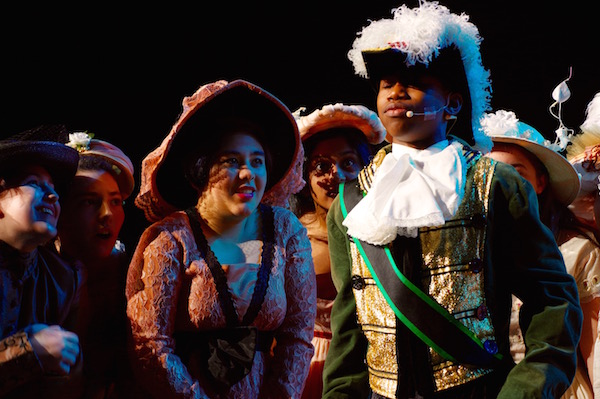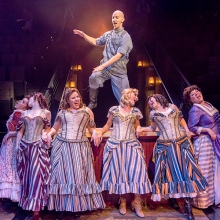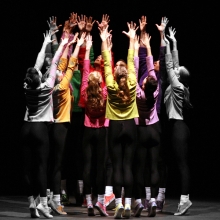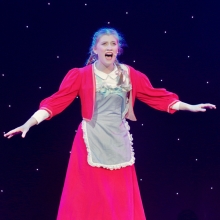Filichia Features: Happy 20th, Broadway Junior!
Filichia Features: Happy 20th, Broadway Junior!
Although the opening song of BRING BACK BIRDIE -- the 1981 sequel to BYE BYE BIRDIE – was called “Twenty Happy Years,” the show didn’t last nearly that long on Broadway.
It managed only three nights, in fact.
But Music Theatre International’s Broadway Junior series can genuinely boast of twenty happy years. Since 1996, when MTI’s Chairman and CEO Freddie Gershon initiated the idea of hour-long condensed versions of musicals, more than 100,000 Broadway Junior productions have taken place in North America. Upwards of 500,000 educators and five million students have collaborated to put them on stage – which has allowed more than twenty-five million to witness them.
Can there possibly be a better place to celebrate such a significant birthday than The Junior Theater Festival? Each third Saturday morning in January, thousands of teachers and students flock to Atlanta to show which Broadway Junior titles they’ve been performing.
“Now we have 115 schools from 29 states as well as South Korea, New Zealand and Australia,” states Timothy Allen McDonald, the founder and CEO of iTheatrics, which launched the festival 11 years ago. “This year, we sold out in six weeks.”
So plenty of kids are here, most of whom are middle schoolers. In other words, at JTF, the Mermaids really are Little.
Because so many schools and extracurricular programs are in attendance, a strictly enforced 15-minute time limit is imposed on each show. So we’ll really be seeing "Jr." versions of Broadway Junior shows.
Although directors tend to choose newer shows, Dee Ann Brill looked back to 1947 and selected FINIAN’S RAINBOW, JR. Brill heads the CCM (as in Cincinnati Conservatory of Music) Preparatory Department. “I chose FINIAN’S partly because it deals with immigration, which is an issue on which everyone currently has an opinion,” she says.
The audience bears her out by guffawing at the ignorant and racist Senator Rawlings’ complaint: “My relatives have been having trouble with immigrants ever since we came to this country.”
There’s another important message to be had in “That Great Come-and-Get-It Day,” in which the less-than-wealthy citizens hope for an influx of money. They certainly want the chance to “keep it,” but they also say that they’ll “share it.” Lovely! The way the kids deliver the line shows that they understand the importance of what lyricist E.Y. Harburg meant.
Senator Rawlings, by the way, is played by a girl. And why not? Congress currently has 20 female senators (although we do hope that they’re all more enlightened than Rawlings).
There’s even a bit of non-traditional casting in the Shreveport, Louisiana’s Academy of Children’s Theatre’s production of LEGALLY BLONDE, JR.; their Elle Wood simply isn’t that blonde. And although MULAN, JR. is set in China, GCRC Encore Kids from Garden City, Kansas offers an all-Caucasian cast – which dovetails nicely with the all-Asian cast in THE MUSIC MAN, JR. It comes courtesy of Baayork (The original Connie in A CHORUS LINE) Lee, Francine Espiritu and Kyle Garrin who’ve brought the kids here from P.S. 124 in New York.
“Ya got trouble right here in River City!” insists Harold Hill --correction, ONE of three Harold Hills, who literally passes a hat to the lad next to him when the time comes for his successor to take over the song. By the time the chorus does “Gary, Indiana” and states that “There is just one place that can light my face,” we know we’re certainly in one place that’s lighting ours.
Plenty of pony tails swish around when The Studio of the Sooner Theatre (from Norman, Oklahoma) does THE LITTLE MERMAID, JR. King Triton has the roaring authority of a kid who’s heard many parents make demands on their kids. Ursula has such a Brechtian feel for “Poor Unfortunate Souls” that a THREEPENNY OPERA is definitely in her future. At the end, Ariel and Prince Eric wave with William-and-Kate authority.
Costumes are not important at JTF. In fact, when Skies (sic) the Limit (from Miami) does THE LION KING, JR., the kids merely wear lilac-colored T-shirts and make no attempt to look like lions or tigers or bears. Oh, my, though -- they do a fine job in creating their own choreography to “Circle of Life” and sustain the serious mood until the very end, when they thrust their arms and clenched fists high in the air to express their triumph.
Here’s a Wall Street tip for you: next November, buy stock in Canon, Samsung and Sony, because it’ll have to go up after hundreds of parents buy videocameras so that they can immortalize their kids’ JTF performances. Many wearing “Drama Mama” and “Drama Dad” T-shirts are lugging quite a bit of equipment with them.
After each presentation, however, parents immediately put the camcorders on the floor so that can dispense hearty applause and loud cheers. The kids in the audience join them, for they too have been part of a presentation and know how much work, talent and effort went into the performance they just witnessed.
Says Lisa VanDerveer, a parent whose daughter performs with The Brick (New Jersey) Children’s Community Theatre, “The cut-throat attitude between kids that I’ve seen in other places is completely absent here. This is a positive, loving and enveloping environment.”
True; after each presentation, seldom is heard a discouraging word from the two adjudicators assigned to each room. That’s mostly because there’s so much to praise: “Nice to hear sopranos” ... “I was taken by the smiles on your faces. I was on the lookout for the kids who had plastic smiles and didn’t find them.”
Oh, there are gentle criticisms: “You did get a little ahead of the music” is said as often as “You came in a little late there.” The kids respond by nodding as if to say “Guilty as charged.” They’ve already learned that criticism can be constructive and helpful.
There’s advice, too: “Your head voice is your friend. Don’t belt everything”… “Even if you’re in the ensemble and don’t seem to have a purpose in the scene, you must give yourself a purpose in the scene” … “Keep goin’, sweetie.”
“How old are you?” is often asked followed by looks of astonishment on adjudicators’ faces after they learn that the kid is two or three years younger than they’d assumed. That often leads to the ultimate compliment: “Are you really a kid or just a short adult who’s been sneaked in to make the show even more professional than it is?”
The directors get some advice, too: “Tall kids deserve to be in the front, too” … “You don’t have to replicate the Disney movie on stage” … “Just because you have a kid or kids who can do cartwheels doesn’t mean that you always have to have a cartwheel in your show.”
Broadway Junior isn’t resting on its laurels. Three more titles are joining the fold, and on Sunday, the JTF audience sees excerpts from them.
In PETER PAN, JR., the island of Neverland seems to have experienced a population explosion, for there are dozens upon dozens of Lost Boys (and, need we add, Girls). That’s because three Tennessee troupes have joined forces to get this PETER PAN off the ground: Bradley Academy Musical Theatre or Murfreesboro; Roy Waldron Elementary Drama in La Vergne and University School of Nashville. In Neverland, they sing, “You can never, ever grow old.” Yes, but musical theater keeps you young, too.
MAGIC TREE HOUSE: A GHOST TALE FOR MR. DICKENS makes time-travelers Jack and Annie the victims of a crime, but when they call for a policeman, the perpetrators claim that Jack and Annie did the stealing. And because the kids are dressed unlike anyone else, they’re immediately and much too hastily judged guilty. In an era when profiling is an issue, this incident has an all-too-contemporary ring.
The Community Theatre of Greensboro, North Carolina does MADAGASCAR, JR. and fills the stage with a zebra, lemur, penguins, lemurs and a lion king of a different kind: because the zoo provides three meals a day and a roof over his head, he’s very happy with his lot in life. Whether he should want more is part of the drama.

And that wasn’t all. Teachers and students collaborated on a heavenly mega-mix of show songs. Some were plaintive (“Pure Imagination,” “Different,” “Alone in the Universe”) and others defiant (“Forget about the Boy,” “It’s the Hard-Knock Life,” “Legally Blonde”), but considering that musical theater is by and large an optimistic medium, most songs were celebratory: “I Am the Very Model of a Modern Major-General,” “To Life,” “Fame,” “Day by Day” and “You Can’t Stop the Beat,” after which you almost couldn’t stop the cheers and applause.
Once the adjudicators’ recommendations are tallied, awards are given. Any hall that accommodates 6,000 people is obviously vast, so to ensure that everyone in all 47 (yes, 47) rows can see, there are TV screens that rival the size of the sign over the Winter Garden. How exciting that when the awardees are announced, the kids and teachers see their name in lights.
However, Leo Cocovinis, who’d played the offspring of Simba and Nala, wasn’t at all impressed that his name was Jumbo-tronned. But considering that Leo is all of three-and-a-half MONTHS old, he can be pardoned for being cavalier.
His father is Jason Cocovinis, Music Theatre International’s Director of Marketing. Don’t mutter “It’s not what you know, it’s who you know”, I can assure you that nepotism had nothing to do with it. Leo gave the best performance I’ve ever seen from a 105-day-old kid.
You may e-mail Peter at pfilichia@aol.com. Check out his weekly column each Monday at www.broadwayselect.com, Tuesday at www.masterworksbroadway.com and Friday at www.kritzerland.com. His book The Great Parade: Broadway’s Astonishing, Never-To-Be Forgotten 1963-1964 Season is now available at www.amazon.com.
Share
Callboard
-
Shake and shimmy it with the #Hairspray20Challenge! Join MTI and Broadway Media in celebrating 20 years of #Hairspray. Duet this here or find us on TikTok! Special thanks to @broadwaymedia and @jammyprod. Choreography Guides are a licensor official resource that provides step-by-step instruction from Broadway and professional choreographers for your productions! Visit @broadwaymedia to learn more. #mtishows #youcantstopthebeat #hairspraymusical #goodmorningbaltimore
View on Instagram

























